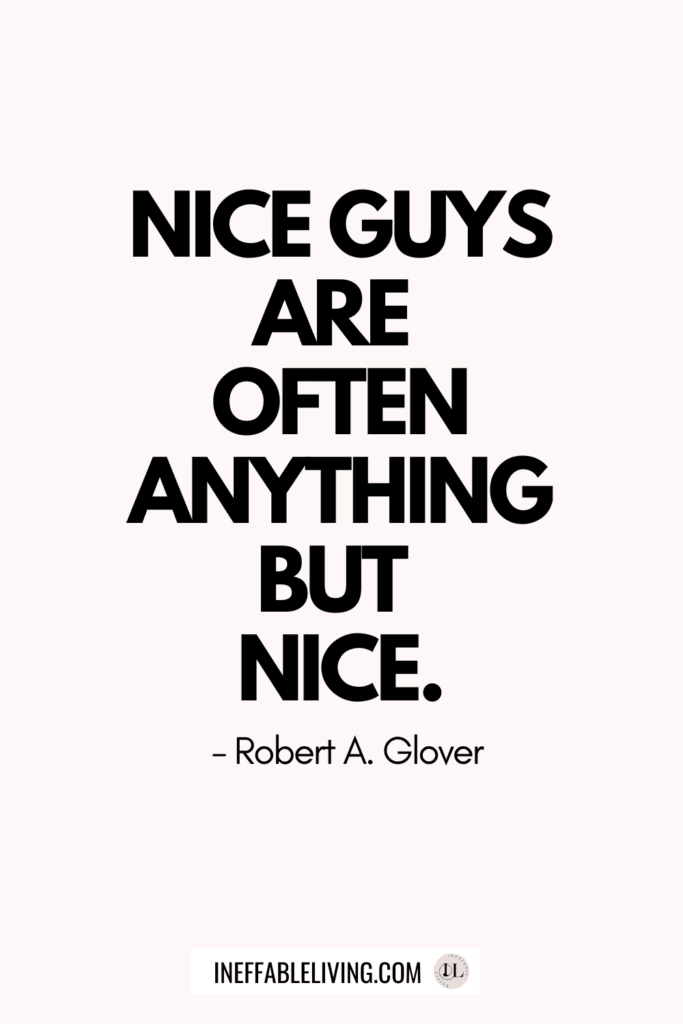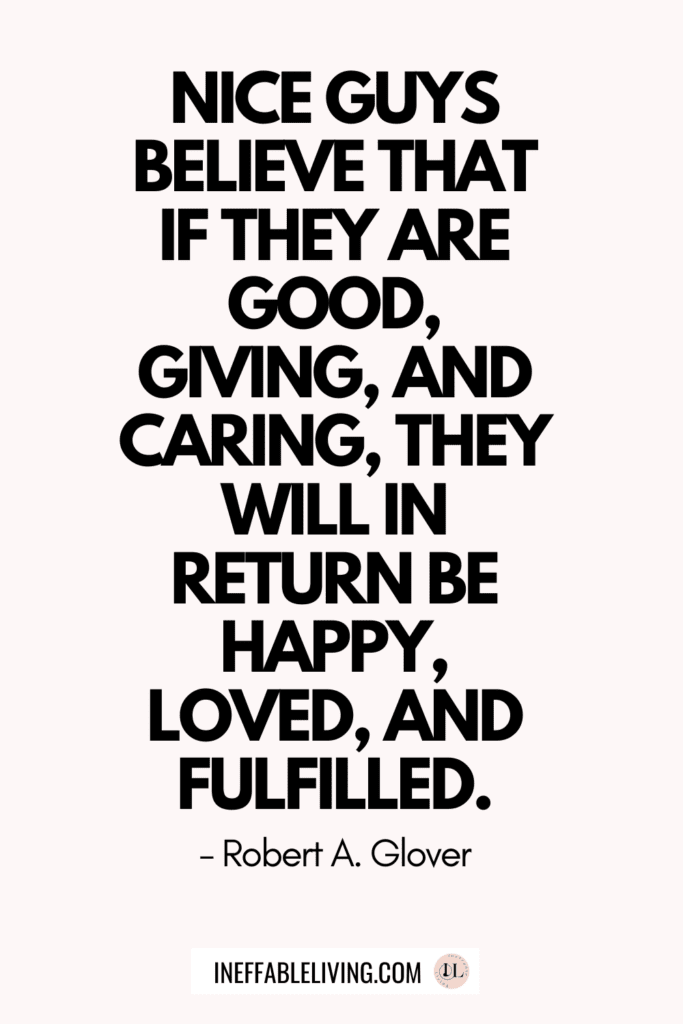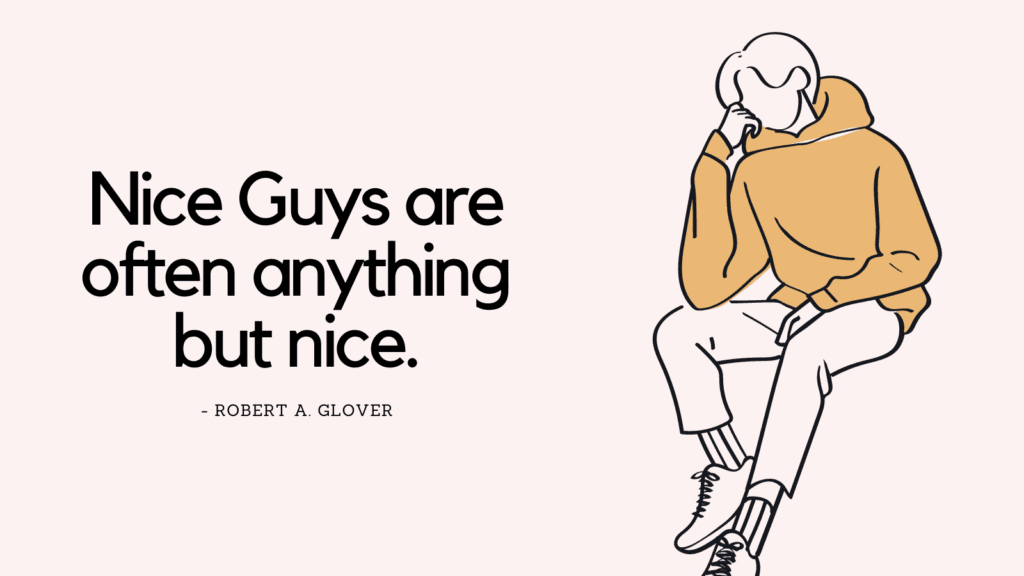This post contains some of the best Nice Guy quotes.
Who Is The Nice Guy
The Nice Guy as defined by Dr. Robert Glover, author of No More Mr. Nice Guy, is someone who:
Always seeks the approval of others. They are happiest when they make others happy.
Therefore, they will go to great lengths to avoid conflicts.
They are concerned about looking good, being generous, and in general being different from other men.
Nice Guys believe that by doing this, they will in return be happy, loved, and fulfilled.
Unfortunately, this is not how it works.
Nice Guys struggle in vain to experience the happiness they believe they deserve.
No matter how hard they tried, their life strategy simply fails to produce the desired results.
They end up feeling helpless and resentful which makes these guys anything but nice.
Related: Nice Guy Syndrome Test (+Best 19 Practical Strategies To Overcome The Nice Guy Syndrome)
11 Signs of Nice Guy Syndrome
While everyone is unique Nice Guys usually share some of these common characteristics:
1. They are givers.
Nice Guys believe that their generosity is a sign of how good they are and will make others love them.
2. They are caretakers.
Nice Guys frequently, and usually without being asked, attempt to solve others’ problems and fulfilling their needs.
Related: Codependency Savior Complex: 14 Clear Codependency Signs & How to Overcome It
3. They seek approval from others.
Nice Guys always seek validation from others. Everything they do, to some degree, is an attempt to gain someone’s approval especially when it comes to relationships.
4. They avoid conflicts.
Nice Guys will go to great lengths to avoid conflicts and avoid upsetting anyone.
5. They believe they must hide their perceived flaws and mistakes.
Nice Guys are afraid others might shame them or abandon them if some of their mistakes are exposed.
6. They always seek the “right” way to do things.
Nice Guys believe that if they can figure out the right way to do things, then their life would become problem-free.
7. They repress their feelings.
Nice Guys see their feelings as a waste of time and energy. They prefer analyzing rather than feeling.
8. They often try to be different from their fathers.
Many Nice Guys have had unavailable, angry, passive, or alcoholic fathers. So it’s not uncommon for these men to make a decision to be the opposite of what their fathers were.
Related: Healing From a Narcissistic Parent: 7 Ways to Heal After Surviving a Narcissistic Parent
9. They are more comfortable relating to women than to men.
Nice Guys usually have few male friends. They seek women’s approval and convince themselves that they’re different from other men.
10. They find it difficult to make their needs a priority.
Nice Guys believe that it’s selfish to put their needs first and that making others’ needs a priority is a virtue.
11. They make their partner their emotional center.
Nice Guys dedicate a great amount of time and energy to their intimate relationships. They believe that if they can make their partners happy, then they will become happy too.
Related: 9 Signs You Might Be Emotionally Addicted — and How to Overcome Love Addiction?

Nice Guy Quotes
1. “Five decades of dramatic social change and monumental shifts in the traditional family have created a breed of men who have been conditioned to seek the approval of others. I call these men Nice Guys.” – Robert A. Glover
2. “Nice Guys are concerned about looking good and doing it “right.” They are happiest when they are making others happy.” – Robert A. Glover
3. “Nice Guys avoid conflict like the plague and will go to great lengths to avoid upsetting anyone.” – Robert A. Glover
4. “Nice Guys are especially concerned about pleasing women and being different from other men.” – Robert A. Glover
Related: Healthy Boundaries Quiz (+Free Pdf Worksheets)
5. “In a nutshell, Nice Guys believe that if they are good, giving, and caring, they will in return be happy, loved, and fulfilled.” – Robert A. Glover
6. “The Nice Guy Syndrome represents a belief that if Nice Guys are “good,” they will be loved, get their needs met, and live a problem-free life.” – Robert A. Glover

7. “Nice Guys are often anything but nice.” – Robert A. Glover
8. “Up to now we haven’t paid much attention to the Nice Guy, but he is everywhere.
He is the relative who lets his wife run the show.
He is the buddy who will do anything for anybody, but whose own life seems to be in shambles.
He is the guy who frustrates his wife or girlfriend because he is so afraid of conflict that nothing ever gets resolved.
He is the boss who tells one person what they want to hear, then reverses himself to please someone else.
He is the man who lets people walk all over him because he doesn’t want to rock the boat.
He is the dependable guy at church or the club who will never say “no,” but would never tell anyone if they were imposing on him.
He is the man whose life seems so under control, until BOOM, one day he does something to destroy it all.” – Robert A. Glover
Related: Best 9 Tips On How To Receive More In Life And Relationships?
9. “The term Nice Guy is actually a misnomer because Nice Guys are often anything but nice.” – Robert A. Glover
10. “Nice Guys are dishonest. These men hide their mistakes, avoid conflict, say what they think people want to hear, and repress their feelings.” – Robert A. Glover
11. “Nice Guys are manipulative. Nice Guys tend to have a hard time making their needs a priority and have difficulty asking for what they want in clear and direct ways.” – Robert A. Glover
12. “Nice Guys are controlling. A major priority for Nice Guys is keeping their world smooth. This creates a constant need to try to control the people and things around them.” – Robert A. Glover
13. “Nice Guys are passive-aggressive. Nice Guys tend to express their frustration and resentment in indirect, roundabout, and not so nice ways. This includes being unavailable, forgetting, being late, not following through, not being able to get an erection, climaxing too quickly, and repeating the same annoying behaviors even when they have promised to never do them again.” – Robert A. Glover
14. “Nice Guys are often terrible listeners because they are too busy trying to figure out how to defend themselves or fix the other person’s problem.” – Robert A. Glover
15. “Nice Guys believe they should be able do everything on their own. They have a difficult time asking for help and try to hide any signs of imperfection or weakness.” – Robert A. Glover
16. “Becoming a Nice Guy is a way of coping with situations where it does not feel safe or acceptable for a boy or man to be just who he is.” – Robert A. Glover
Related: People Pleaser Quiz (+Top 21 Proven Ways to Stop People Pleasing)
17. “Regardless of whether they were abused, abandoned, neglected, shamed, used, smothered, controlled, or objectified, all Nice Guys internalized the same belief — it was a bad or dangerous thing for them to be just who they were.” – Robert A. Glover
18. “Many Nice Guys have adopted a female perspective of masculinity and are comfortable having their manhood defined by women.” – Robert A. Glover
19. “Just about everything a Nice Guy does is consciously or unconsciously calculated to gain someone’s approval or to avoid disapproval. Nice Guys seek this external validation in just about every relationship and social situation, even from strangers and people they don’t like.” – Robert A. Glover
20. “By trying to please everyone, Nice Guys often end up pleasing no one — including themselves.” – Robert A. Glover
21. “Because Nice Guys do not believe they are OK just as they are, they find a multitude of ways to convince themselves and others that they are lovable and desirable. They may focus on something about themselves (physical appearance, talent, intellect), something they do (act nice, dance well, work hard), or even something external to themselves (attractive wife, cute child, nice car) in order to get value and win other’s approval.” – Robert A. Glover
Related: Best 6 Ways to Let Go of Wanting to Control Everything

22. “Being a Nice Guy is the ultimate attachment for these men. They genuinely believe their commitment to being “good” and doing it “right” is what makes them valuable and compensates for their internalized belief that they are bad.” – Robert A. Glover
23. “Nice Guys interpret a woman’s approval as the ultimate validation of their worth. Signs of a woman’s approval can take the form of her desire to have sex, flirtatious behavior, a smile, a touch, or attentiveness.” – Robert A. Glover
24. “Nice Guys constantly report that their own moods are often tied to the moods of their partner. If she is happy and doing OK, so is he. If she is angry, depressed, or stressed, he will feel anxious until she is fixed.” – Robert A. Glover
25. “When Nice Guys put a woman or women on a pedestal and attempt to win their approval, sooner or later, this adoration will turn to rage when these objects of worship fail to live up to the Nice Guys’ expectations.” – Robert A. Glover
Related: Karpman’s Drama Triangle & Codependency
26. “Nice Guys believe they must hide or distract attention from any perceived shortcoming.” – Robert A. Glover
27. “Since Nice Guys strive so hard to be good, giving, and caring, they believe these acts should build up a credit that wipes clean any wrong they might do.” – Robert A. Glover
28. “Nice Guys try to fix situations by doing whatever it takes to get the other person to stop being upset.” – Robert A. Glover
29. “Nice Guys build walls that prevent others from getting too close. Understandably, this affects their ability to be intimate, but it also protects them from the consequences of being found out.” – Robert A. Glover
30. “The process of breaking free from ineffective Nice Guy patterns doesn’t involve becoming “not nice.” Rather, it means becoming “integrated.”” – Robert A. Glover

Resources
- The Book: No More Mr Nice Guy: A Proven Plan for Getting What You Want in Love, Sex, and Life by Robert A. Glover
- Nice guy – Wikipedia
- The sinister logic behind ‘Nice Guy Syndrome’, explained by psychologists | The Independent | The Independent
- Dating preferences of university women: an analysis of the nice guy stereotype – PubMed (nih.gov)




